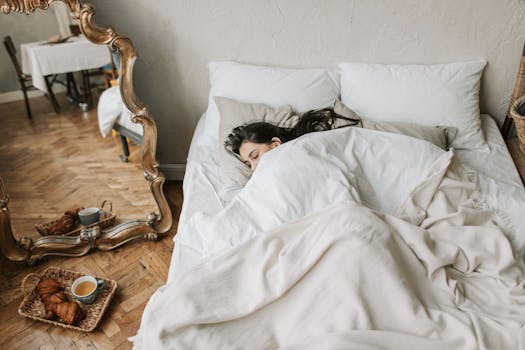
“
Creating a Balanced Sleep Routine for Better Rest
Focus Keyword: Creating a Balanced Sleep Routine

Creating a balanced sleep routine is essential for improving the quality of your rest and overall well-being. A good sleep routine can help you fall asleep faster, sleep more soundly, and wake up feeling refreshed and revitalized. In this article, we will explore the importance of a balanced sleep routine and provide tips on how to create one that works for you.
Why is Sleep Important?

Sleep is a vital component of our overall health and well-being. During sleep, our body repairs and regenerates damaged cells, builds bone and muscle, and strengthens our immune system. Sleep also helps us to consolidate memories, process emotions, and regulate our appetite and metabolism. Chronic sleep deprivation can lead to a range of health problems, including obesity, diabetes, cardiovascular disease, and mental health disorders.
What is a Balanced Sleep Routine?

A balanced sleep routine is a consistent sleep schedule that allows you to get the quality and quantity of sleep you need to feel rested and refreshed. A balanced sleep routine should include a consistent sleep schedule, a relaxing bedtime routine, and a sleep-conducive environment. It should also involve avoiding stimulating activities and electronics before bedtime, avoiding caffeine and nicotine, and getting regular exercise.
How to Create a Balanced Sleep Routine

Creating a balanced sleep routine involves several steps, including:
- Establishing a consistent sleep schedule: Go to bed and wake up at the same time every day, including weekends.
- Creating a relaxing bedtime routine: Develop a calming pre-sleep routine, such as reading a book, taking a warm bath, or practicing relaxation techniques like deep breathing or meditation.
- Creating a sleep-conducive environment: Make your bedroom a sleep sanctuary by ensuring it is dark, quiet, and cool, and investing in a comfortable mattress and pillows.
- Avoiding stimulating activities and electronics before bedtime: Avoid watching TV, using your phone or computer, or engaging in stimulating activities at least an hour before bedtime.
- Avoiding caffeine and nicotine: Avoid consuming caffeine and nicotine in the hours leading up to bedtime, as they can disrupt your sleep patterns.
- Getting regular exercise: Regular exercise can help improve sleep quality, but avoid vigorous exercise within a few hours of bedtime.
Tips for Creating a Balanced Sleep Routine

In addition to the steps outlined above, here are some additional tips for creating a balanced sleep routine:
- Try to avoid napping during the day, as it can disrupt your sleep patterns at night.
- Avoid eating a heavy meal close to bedtime, as it can disrupt your sleep patterns.
- Try to manage stress and anxiety through relaxation techniques, such as deep breathing or meditation.
- Avoid exposure to screens and electronic devices at least an hour before bedtime.
- Get some morning sunlight exposure to help regulate your circadian rhythms.
Conclusion

Creating a balanced sleep routine is essential for improving the quality of your rest and overall well-being. By establishing a consistent sleep schedule, creating a relaxing bedtime routine, and creating a sleep-conducive environment, you can improve the quality of your sleep and wake up feeling refreshed and revitalized. Remember to avoid stimulating activities and electronics before bedtime, avoid caffeine and nicotine, and get regular exercise to help improve sleep quality.
Additional Resources

For more information on creating a balanced sleep routine, check out the following resources:
- National Sleep Foundation: https://www.sleepfoundation.org/
- Centers for Disease Control and Prevention: https://www.cdc.gov/sleep/index.html
- American Academy of Sleep Medicine: https://aasm.org/
See more:
https://www.sleepfoundation.org/
https://www.cdc.gov/sleep/index.html
https://aasm.org/



